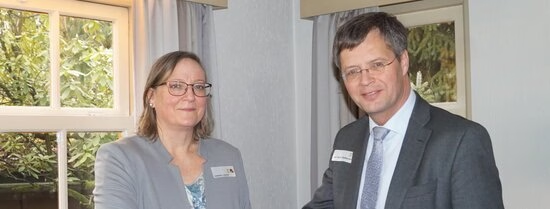photo Else Loof / Pix4Profs
How to break negative stereotypes that keep women on the dole? For years now, Erasmus School of Social and Behavioural Sciences alumna Nora Kasrioui has been connecting women on benefits with successful business women. Recently she decided to include men in this emancipatory undertaking. Her women’s rights organisation ‘Brood en Rozen’ (‘Bread and Roses’) recently won the Ab Harrewijn prize with the project ‘Woman on the dole dates CEO’ (‘Bijstandsvrouw date Topman’).
‘I fight for the social progress of women, all women,’ Nora emphasises. ‘You often see that the higher educated organise themselves, but women in poverty are often too busy looking after their kids and everything that comes with that. They hardly find time to pay attention to themselves. In the past society was divided along religious lines, nowadays we have a “diploma democracy”. I want to connect those groups, they need each other: roughly 60% of the work that needs doing, requires people with practical skills rather than theoretical knowledge.’
Being on benefits is like a crime
Not to say that all woman on unemployment benefits have only practical skilss, Kasrioui quickly emphasises. Brood en Rozen works with a very diverse group of women: some were self-employed until the commissions dried up, others suffered a divorce or lost their jobs. What binds them is their dependency on government aid and their ambition to get out of it.
It is horrific that women on the dole are often greeted with so much disdain, portrayed as people who like to beg, says the alumna. The benefits scheme was designed to provide solidarity with those who failed to generate income: a beautiful arrangement, to Kasrioui’s mind. Yet those using it are regarded as profiteers. Once unemployed, many lose their network and often their feeling of self-worth along with it.
‘He’s got the network. She’s got the ambition.’
‘During my studies, I learned to see the differences between public and private organisations,’ Kasrioui explains. ‘Once the economy recovers, businesses notice first. The government follows. That’s how I knew that if I wanted to change the situation of these women, I needed to address the corporates.’ And what better way to connect people than over a good meal? So that’s what Nora did: after giving the women a training in self-awareness and networking she had them driven to the restaurant in a shiny limousine.

‘He’s got the network. She’s got the ambition,’ says the headline reporting on these unexpected dates. Though Brood en Rozen mainly invited CEOs, they also managed to rope in a man like Jan Peter Balkenende, the former prime minister of the Netherlands. Well connected but more importantly an extremely kind and warm man, Kasrioui found. Like many of the CEOs, he went out his way to connect her to relevant people. For the men involved this was not just a lunch date, but a chance to better understand women on benefits, as well as an opportunity to make a significant change in their daily lives.
Quotum
Nora believes that medium to large enterprises should have an in-built quota for hiring women who have been on the dole for long. The jobs on offer should be tailor made, and include an individual trajectory that prevents these women from dropping out. Many have been disappointed by the system several times before: all the more reason to be extra careful and treat them with the respect they deserve.

